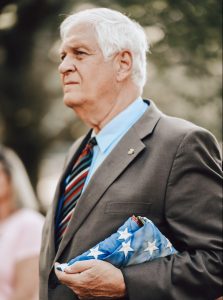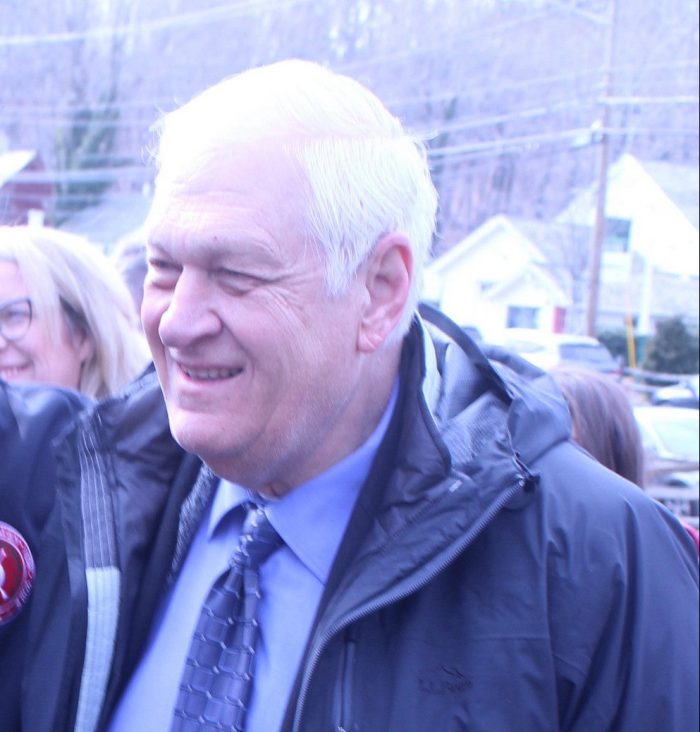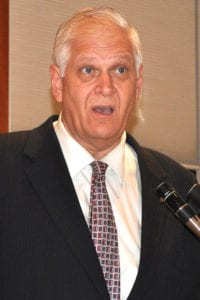New York State Assemblyman Steve Englebright (D-Setauket) has held elective office continuously since 1983. Englebright’s long tenure now comes to a close.
In a tight state election for District 4 last month, Englebright narrowly lost to his Republican Party challenger Ed Flood (R-Port Jefferson). In an exit interview, the outgoing assemblyman reflected upon his pathway into government, the legislative victories throughout that time and the meaning of public service.
The road to politics
Growing up, the young Englebright spent much of his time in libraries. He found refuge in books, which satiated his curiosity and “compelling interest in how things worked.” He also nourished a lifelong fascination with history through those hours devoted to learning.
Leading up to his first run for office, Englebright said he was deeply disturbed by the environmental degradation characteristic of those times. The “almost daily reports” of overdevelopment and sprawl, oil spills and drinking water contamination, each had left a deep and abiding impression on him.
He was teaching geology at Stony Brook University when he began considering public life. “I realized that drinking water was the first limiting factor for the continued well-being of this Island, and I was not really seeing any meaningful public policy growing out of the reports of chaos,” he said.‘The proper role of government is to protect the people who sent you.’ — Steve Englebright
The late professor Hugh Cleland, from the SBU Department of History, would prove to be the catalyst behind Englebright’s ascent to politics. Cleland sat down with him at the campus student union. For several hours, the two discussed a possible bid for a Suffolk County legislative seat.
“This was a really serious and credible and well thought-out request that he was making,” Englebright said. “So I didn’t just wave it off. I gave it some thought and, sure enough, I found myself saying, ‘What’s next?’”
After that meeting, Englebright decided to run and was elected to the county Legislature in 1983. He won election after election for the next four decades.
County Legislature
Upon entering the county Legislature, Englebright simultaneously confronted an array of environmental dilemmas. He described the defunct Long Island Lighting Company, the precursor to today’s Long Island Power Authority, as “at that time wanting to build a small galaxy of nuclear power plants on Long Island.” He stressed that the utility company was favoring its shareholder interests at the residents’ expense.
Englebright successfully championed, along with a grassroots movement of LILCO ratepayers, against the construction of the Shoreham Nuclear Power Plant and other nuclear plants to follow. Their resistance efforts were grounded primarily in the risks associated with evacuation.
Another major policy issue during his early political career was the protection of groundwater and surface waters in Suffolk County. “I pushed successfully for the largest county-level open space program in the nation,” he said. He was one of the earliest critics against sprawl.
As a county legislator, he initiated the first plastics ban in the nation. Though ahead of his time on the issue, he admitted that not enough has been done elsewhere to counteract the problem, which he said “has exploded into a worldwide catastrophe.”
He sponsored legislation excising a small fee on hotel and motel rooms, considering the measure as a fee on tourists allowing for their continued enjoyment of the area through reinvestment into the county’s most attractive destinations.
“If you wonder why county Legislator [Kara] Hahn [D-Setauket] is able to have some discretion to provide funding to Gallery North or the Reboli Center, that funding is coming from the hotel/motel room fee,” he said.
State Assembly

As a state assemblyman, Englebright quickly picked up where he left off, building upon and expanding his county policies at the state level. Among his earliest actions was the Long Island Pine Barrens Protection Act, a state law ensuring the preservation of the Pine Barrens as open space.
He sponsored some of the original laws in New York state related to solar power and other renewables. “In my first year in the state Legislature, I was successfully pushing for legislation that had paved the way for the electronic age,” he said.
Englebright added that the Climate Leadership and Community Protection Act was the most crucial legislation he ever sponsored. This ambitious law aims to reduce statewide greenhouse gas emissions by 85% from 1990 levels by 2050.
Englebright also successfully led a statewide ban on purse seining, a highly efficient fishing technique responsible for the depletion of menhaden, or bunker, in New York’s surrounding waters.
“The marine world all depends on having this abundant fish at the base of the food chain,” the assemblyman said. Purse seining allowed large-scale fishing operations to collect “whole schools of menhaden, millions and millions of fish.”
One of the fondest moments throughout his tenure happened just last summer. On a boat trip off the coast of Montauk Point during early morning hours, the sun rising off the horizon line, he witnessed entire schools of menhaden beneath the water.
“The sea was boiling with fish,” he said. “Menhaden, they were back by the billions.”
Reminiscent of his earliest years in libraries, historic preservation would be a significant point of emphasis for Englebright. “I’m very proud of the many properties that are preserved, the historic sites.” Such sites either preserved or to be preserved include Patriots Rock and Roe Tavern in Setauket and William Tooker House in Port Jefferson, among many others.
Even in his final days in office, Englebright made historic breakthroughs. Though his reelection bid was unsuccessful, Englebright rejoiced in yet another major victory for environmental sustainability. Last month, New Yorkers overwhelmingly approved a recent $4.2 billion environmental bond act, a multiyear investment in clean water, air, wildlife and the environment.
Reflections from his community
During his extended time in political service, Englebright has worked alongside countless public representatives at all levels of government. He maintained “they’re not all scoundrels,” adding that many were “superb public servants.”
In a series of written statements and phone interviews, several public representatives and close Englebright associates and friends had an opportunity to weigh in on his legacy of service and commitment to his community.
Englebright “proved himself to be an environmental pioneer, a champion for the causes and concerns of his constituents and an unflinching fighter for the communities he served,” Hahn said. “For those of us who served in elected office with him during his tenure, irrespective of political persuasion or level of government, Steve proved himself to be a friend and mentor who embodied the role of effective leadership in the lives of those we represent.”
As recently as Dec. 6, the Three Village Community Trust honored the assemblyman by renaming the Greenway trail as The Steve Englebright Setauket to Port Jefferson Station Greenway.
Port Jefferson Mayor Margot Garant commented on the characteristics that set Englebright apart from other politicians. She said his scientific background and wide-ranging interests added depth to his political persona.
“He’s a unique legislator in that he’s so well rounded in those other areas and that he’s not just focused on the hard line of the law,” she said. “He’s involved with his community, he’s approachable, he’s caring, he’s kind. He’s a very unique representative, and we’re going to miss him sorely.”
Like Englebright, Port Jefferson village trustee Rebecca Kassay worked in environmental advocacy before entering government. She discussed Englebright’s ongoing extended producer responsibility legislation, which would require producers of packaging materials, rather than taxpayers, to be responsible for managing post-consumer packaging material waste.
“This can be a step toward addressing a multitude of waste management, environmental and financial issues facing municipalities and individuals,” Kassay said. “I hope to see the assemblyman’s colleagues and successor continue advocating for policies with long-term solutions,” adding, “Englebright is the type of commonsense representative we’d like to see more of in government.”
In a joint statement, George Hoffman and Laurie Vetere of the Setauket Harbor Task Force reflected upon Englebright’s importance to local harbors.
“In his time as our state representative, Steve Englebright never forgot the importance of the harbor,” they said. “Assemblyman Englebright found ways to secure needed dollars from Albany to help the task force in its mission of protecting water quality and the sustainability of Setauket and Port Jefferson harbors.”
Joan Nickeson, community liaison of the Port Jefferson Station/Terryville Chamber of Commerce, credited Englebright for the continued flourishment of her area. She said the hotel/motel tax he sponsored had enabled the chamber to conduct its annual summer concert series at the Train Car Park.
“Assemblyman Englebright has continued to be a friend of the chamber by supporting our local businesses and attending our ribbon-cutting ceremonies,” she said.
Within those 40 years, countless other acts and initiatives have come to fruition with Englebright’s assistance. Reflecting on his time in public service, he outlined his political doctrine.
“The proper role of government is to protect the people who sent you,” he said. “If you keep your eye on the prize, you can achieve things for the people who invested their trust in you.”
On the role of the public representative, he added, “Use the office as a bully pulpit, speak truth to power, identify things that are wrong and right them, and treat the office as an opportunity to do good.”
For wielding his office as a force of good for four decades, TBR News Media dedicates Steve Englebright as honorary 2022 Person of the Year.









